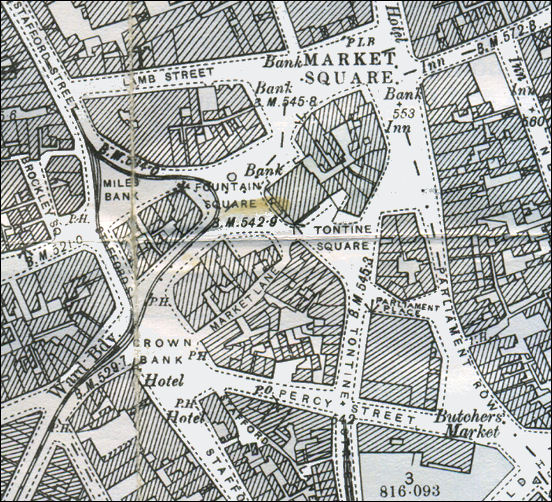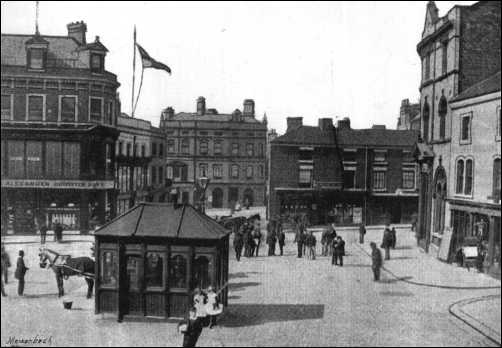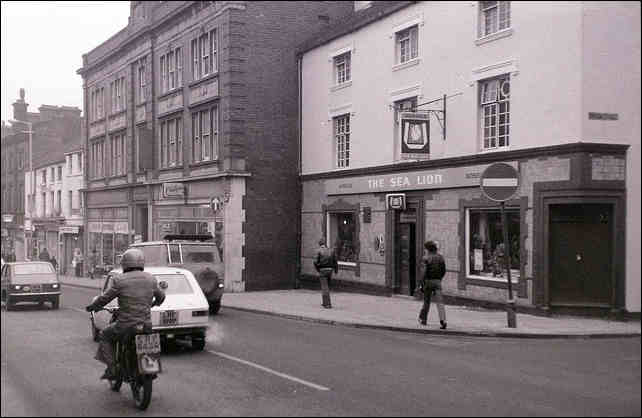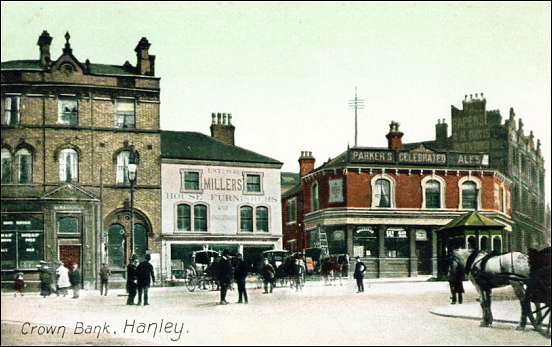![]() back to Portraits of Potteries People
back to Portraits of Potteries People
Biographies
of people from the Stoke-on-Trent &
Newcastle-under-Lyme Conurbations
Jeremiah Yates
![]()
![]()
![]()
next: Charles William Brown, Mine Manager,
artist, Etruria
previous: Jesse Shirley, Hanley Mayor, Flint
& Bone Merchant
Jeremiah Yates b.1808 d.1852
Potter, Chartist, Coffee House Owner, Hanley, Stoke-on-Trent

|
Jeremiah and his wife Ann were living at Crown Bank, Shelton (Hanley)

Hanley
town centre from a 1898 map
Miles Bank & Crown Bank can be seen as adjacent areas

Crown Bank, Hanley - 1893
Crown Bank looking towards Miles Bank on the left is Stafford Street
|
by 1841 Jeremiah and his wife Ann were living at Crown Bank, Shelton (Hanley)....
The neighbours of the Yates family on Crown Bank included -a 'hairdresser, shoemaker, milliner, coaldealer, newsagent, lodging house keeper, publican, three agricultural labourers, butcher, cooper, road surveyor and a pauper. |
One of the early chartist meetings at the Sea Lion Inn

The Sea Lion pub, Town Road, Hanley
| The People's Charter (was first published in May 1838 and there was a meeting in support at the Sea Lion Inn, Hanley on 11 August 1838 and a demonstration of 20,000 people in Hanley in November. |
Jeremiah Yates and chartist activities at his coffee house
Jeremiah Yates was involved in chartist activities and the first printed reference to him is in a report in the newspaper
"The Operative" The issue for 20 January 1839 contained the report:
|
"Chartist Dinner at
the Lamb Inn" A public dinner took place in the large room at the Lamb Inn, Hanley on Monday last, the 7th instant when upwards of 100 sat down to partake of such fare as ought to grace every poor man's table (but who are unhappily deprived of it by the vile place-hunting, sinecure seeking aristocrats of this nation).... After the cloth was drawn, a public meeting was held when Mr. G Mart of Stoke, a tried friend of the Working Classes was unanimously called to the chair". Several resolutions were carried including one "Moved by Mr. John Sutherland, seconded by Mr. Jeremiah Yates that our female friends be requested to lend their able assistance in the further collection of the National Rent". |
In 1841 Thomas Cooper began his Chartist work in Leicester. He established and edited The Commonwealthsman, a radical paper (weekly,lid) and distributed this and other pamphlets to agents in the Midlands. Jeremiah yates was one of these agents and sold this literature to Chartists from his house.
Jeremiah also sold "Beverage", a cheap coffee substitute, which he bought through Thomas Cooper from the Leicester manufacturers Crow and Tirrell.
This letter from Jeremiah Yates to Thomas Cooper were found in Cooper's house when he was arrested in August 1842
12 JUNE 1842 Crown Bank, Hanley
Dear Cooper,
You will please send in my next Parcel
100 What is a Chartist
50 Hints to the army
50 Calumnies Refuted
Second Part of Thos Paines Rights of man
2 Red Books
2 Poor mans Companion
6 F O'Connor on the land
Commonwealthsman as Usual
1 Copies Each of Dr Channings PamphletsI Remain
Yours Truly
Jeremiah Yates
Cooper wrote (English Chartist Circular No. 145 and Temperance Advocate) about his visit to Hanley on 10 April 1842 to the....
"Chartists of Hanley, having been invited to pay them a visit by my friend Mr. Jeremiah Yates who is a weekly purchaser of a small democratic periodical which I then published and from whom consequently I had frequent letters.
The plain hearty, affectionate manners of the people, together with their zeal and the manifest attachment of the leading Chartists to the principles and practice of Teetotalism led me to form a high opinion of them. In the course of the Summer, I promised my correspondent, Mr. Jeremiah Yates, that I would certainly revisit the Potteries."
Yates and chartist riots

Crown Bank, Hanley - c.1900
In 1842 Thomas Cooper stayed at Yate's house and then spoke
at Chartist meetings here at Crown Bank near Yate's coffee housethere were 8-10,000 people at the meeting
Thomas cooper wrote.....
This intention to continue the strikes until the Charter was accepted was to be put to a Chartist meeting on Monday. Cooper writes:
Men from the meeting left Hanley for Longton to persuade others to strike but a riot and violence ensued. At a further meeting on the Crown Bank that evening Thomas Cooper "warned all who had participated in that act that they were not the friends but the enemies of freedom." Nevertheless, rioting and violence had got out of hand. Police and military cordoned off the Potteries, arrested hundreds -including Jeremiah Yates and Thomas Cooper. The Staffordshire Examiner 20 August 1842 reported...
North Staffordshire Mercury 27 August 1842...
|
Trial and conviction of Yates
| N Staffordshire Mercury 27
August 1842...
Jeremiah Yates was thus freed until his trial began at Stafford in October 1842. There is a letter in the library at the Bishopsgate Institute from Thomas Winter at Stafford to Cooper's wife in which he writes on Oct 8 1842:
The Staffordshire Mercury 15th October 1842 reported:
According to the report in The Staffordshire Examiner (Oct 15 1842) the Judge added: "If it (Chartism) meant persons labouring for the general confusion and overthrow of society, he did not think a very sane opinion could be formed of that man's judgment on political matters, although he hoped it would not prejudice the jury. After 10 minutes, the Jury found Jeremiah guilty. The sentence was deferred, bail being given. (The sentence was one year's imprisonment) Staffordshire Advertiser on Saturday, 15th October 1842 also reported:
The Stafford Gaol Register (1841-5) at the Public Record Office mentions his transfer to the penitentiary on 7 Dec 1842 and that he had been 'disorderly' - perhaps meaning 'rebellious' The Calendar of Prisoners of Stafford Gaol (Public Record office) records:
The prison Calendar recorded for each prisoner his reading and writing ability. Illiteracy was commonplace and the political prisoners must have been exceptional. The Northern Star of 17 Dec 1842 mentions Jeremiah as one of the Stafford prisoners transferred to the Penitentiary at Millbank, London. Eight hundred had been arrested and the sentences included:
|
After the riots
The imprisonments and deportations set back Chartism and many quit but, as the leaders were released, the movement revived and Jeremiah was soon active again.
|
NS 11 Nov 1843 under Chartist Intelligence "Hanley. A meeting of the Chartists of the above place was holden on Monday evening last at Mr. Jeremiah Yates's Temperance Hotel when nearly 100 enrolled themselves under the New Plan of organisation. A Council has been formed and all those who are desirous of taking cards of membership may do so by applying at Jeremiah Yates's Temperance Hotel, Miles Bank, Shelton where meetings are holden every Monday evening at seven o'clock for carrying out the objects of our body" |
|
N. Staffordshire Mercury 18 May 1844 "Meeting on Crown Bank, Hanley On Monday evening last a meeting was held on the Crown Bank to return thanks to Mr Alderman Copeland and Mr Ricardo, the members for this borough and to Mr.T Duncombe for their opposition to the obnoxious master and servants bill, also against the Irish Registration Bill and in favour of the release of Thomas Cooper. The number present has been variously estimated at from 1000 to 2000. Mr. Jeremiah Yates was in the chair." |
Yates death and obituary
(Saturday, 16th October 1852) contained the following obituary:Staffordshire Advertiser
|
"Jeremiah Yates. On Monday morning last (October 11 1852) after a short illness, aged 42, Mr. Jeremiah Yates Assistant Surveyor of Highways for the Township of Shelton a situation which he had filled for several years. The deceased was an early advocate of the total abstinence cause, and afterwards became a prominent actor in the Chartist agitation". |
The People's Paper of London (with the sub-title 'The Champion of Political Justice and Human Rights') of Saturday Oct 16 announced:
|
DEATH. On Monday morning last, awfully sudden, to the inexpressible grief of his family and friends, died Mr. Jeremiah Yates of the Temperance Hotel, Crown Bank, Hanley, Staffordshire Potteries, in the 42nd year of his age, leaving a wife and three children unprovided for. Mr. Yates was for many years a firm and consistent advocate of the Rights of Man, ever at his post, in season and out of season, mild and conciliating in his language, yet never yielding his principles. His kindness and charity were proverbial, and he never withheld his mite from the indigent stranger or the poverty stricken workman in his own locality. His loss will be deeply felt in this neighbourhood leaving a vacancy that cannot easily be filled up. On the announcement of his death not a dry eye was to be seen - such a scene of grief and sorrow was never before witnessed in this neighbourhood. It is the intention of the friends of the deceased, to adopt means to continue the bereaved widow in her present residence and that the house shall be conducted for her benefit, the same as during the lifetime of her lamented husband. |
St. Mark's - Shelton Parish Church where Yates was buried in 1852
The Staffordshire Advertiser 23 October 1852:
|
"Hanley: Funeral of the late Mr. Jeremiah Yates In our obituary of last week we noticed the death of Mr Yates, the assistant surveyor of highways for Shelton. His remains were interred in the burial ground of Shelton Church on Sunday afternoon, and were followed to the grave by a very large number of his friends who walked in procession. The road from Crown Bank (his place of residence) to the church was lined with spectators and a dense crowd surrounded the burial ground". |
![]()
![]()
![]()
next: Charles William Brown, Mine Manager,
artist, Etruria
previous: Jesse Shirley, Hanley Mayor, Flint
& Bone Merchant
|
Related pages.. Detailed history Of Jeremiah Yates |